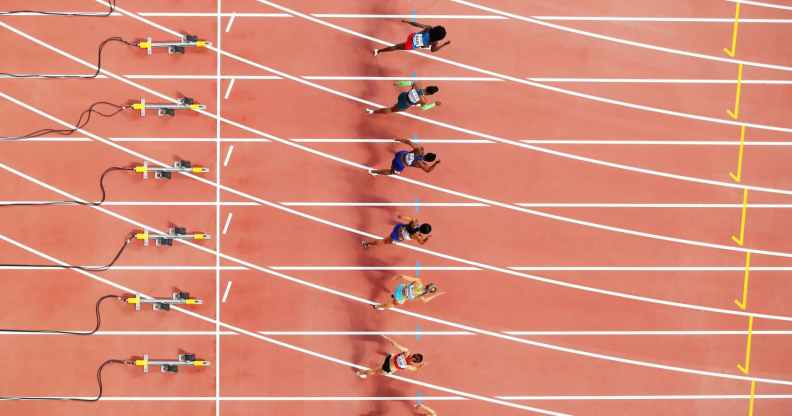New guidance for trans athletes in UK sport slammed as ‘extremely harmful’: ‘Sport is for everyone’

Athletes leave the starting blocks at the IAAF World Athletics Championships Doha 2019 (Christian Petersen/Getty)
A major review into the inclusion of trans athletes has suggested that some sports should create different categories because “inclusion, fairness and safety” often cannot co-exist.
The new guidance released on Thursday (30 September) follows an 18-month consultation from the Sports Councils Equality Group (SCEG), a body comprised of Sport England, Sport Scotland, Sport Northern Ireland, Sport Wales and UK Sport.
The report argues that trans women retain physique, stamina and strength advantages when competing in female sport, and that “for many sports, the inclusion of transgender people, fairness and safety cannot co-exist in a single competitive model”.
It therefore concludes that the current policies on trans inclusion are not fit for purpose and require a reset.
Going forward, the SCEG suggests that the governing bodies for each sport should work out their priorities and choose whether they will focus on inclusion or “competitive fairness”.
The report has been heavily criticised by LGBT+ groups, which have raised particular concern at the claim that transgender inclusion runs counter to fairness.
Robbie de Santos, director of communications at Stonewall, said: “It is extremely harmful for this guidance to suggest that there is an inherent conflict between inclusion, fairness and safety, when in reality, the three go hand in hand.
“Amidst the current manufactured moral panic around trans people, it is important that governing bodies’ policies are based on solid evidence about the reality of sport and inclusion.
“The truth is that trans women are already participating in sports, without any evidence that they are disproportionately succeeding in competitive sport or posing safety risks – which this guidance fails to properly reflect in its use of data.”
He continued: “The beauty of sport is that it is for everyone, and this guidance moves us away from that core principle, by creating confusing, unnecessary distinctions for sporting bodies to navigate.
“We urge that the Sport Councils Equality Group reflect on the real-life impacts of this guidance on trans people who play sport, and support the development of more robust research, based on the current realities of trans inclusion in sport, in order to better guide governing bodies.”
The trans children’s charity Mermaids also raised concern, warning that the report will cause “unnecessary hostility, exclusion and confusion” for trans athletes.
“We are disappointed to read this review, which rather than focussing on bettering its existing guidance for trans people in sport, yet again ignores the lived experiences of trans people, and misinterprets the Equality Act and academic literature,” it said in a statement.
“This report will have ramifications for trans people in the sporting community, and only seeks to cause unnecessary hostility, exclusion and confusion for those wishing to participate in sport.
“It is important to remember that the SCEG report only exists as guidance: it is not mandatory. Sports groups and organisations are entitled and encouraged to write and implement their own policies on including trans and non-binary people in sport.”
At present most sports follow the guidelines set by the International Olympic Committee (IOC) in 2015, which permit trans women to compete in female sport if they suppress their testosterone levels below 10nmol per litre.
However, in August the IOC admitted these rules were “not fit for purpose” and would be revised in the next few months.

